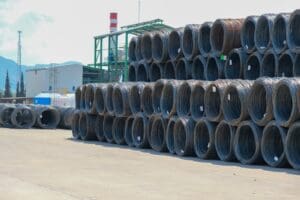
British manufacturers face hundreds of millions of pounds in additional costs each year after the United States sharply increased tariffs on exports containing steel and aluminium.
President Trump has extended so-called Section 232 measures, imposing a 25 per cent duty on a wide range of finished goods including construction machinery, automotive components, pumps, compressors and even furniture.
The move, which follows lobbying by the American steel industry, comes despite an assumption that UK exporters were settled at a 10 per cent tariff under previous agreements.
Among the hardest hit is JCB, the Midlands-based construction equipment maker and one of the UK’s largest private companies. Industry groups also warn of repercussions for the renewables sector, with wind turbine suppliers and other clean energy manufacturers exposed to higher costs.
Jeffrey Kessler, US under-secretary of commerce for industry and security, said the action “expands the reach of the steel and aluminium tariffs and shuts down avenues for circumvention, supporting the continued revitalisation of the American steel and aluminium industries.”
Philip Bell, president of the US Steel Manufacturers Association, added: “The steel tariffs are necessary for the national security that a strong steel industry provides. One of President Trump’s signature achievements of his second term is renewing and strengthening the steel tariffs.”
The US market for UK goods affected is estimated to be worth £1.5 billion. Crucially, the tariffs apply to products already in transit.
The Construction Equipment Association (CEA) confirmed that from 18 August, UK-origin machinery and key components will face the 25 per cent duty. For non-UK exporters of such goods, the tariff is even higher at 50 per cent.
However, the CEA warned that complex compliance rules could further increase costs. If exporters cannot prove the percentage of metal content in goods at the point of entry, US Customs may levy the tariff on the full value of the product.
“For complex machines made from thousands of components, many sourced from suppliers who do not provide detailed material breakdowns, complying with these rules will be extremely difficult in practice,” said Viki Bell, chief executive of the CEA. “Initial analysis indicates that major UK exporters could face additional costs running into hundreds of millions of pounds each year.”
Business groups are urging the UK government to intervene. The British Chambers of Commerce said firms urgently need clarity and practical support.
“The Section 232 tariffs are a concern for UK exporters, their orders, prices and long-standing customer relationships in the US,” said William Bain, head of trade policy. “With inflation rising and cost pressures biting, government intervention would provide the certainty that many export supply chains to the US need.”
The Department for Business and Trade has yet to comment.
Read more:
UK manufacturers hit by 25% US tariffs on steel and aluminium exports






